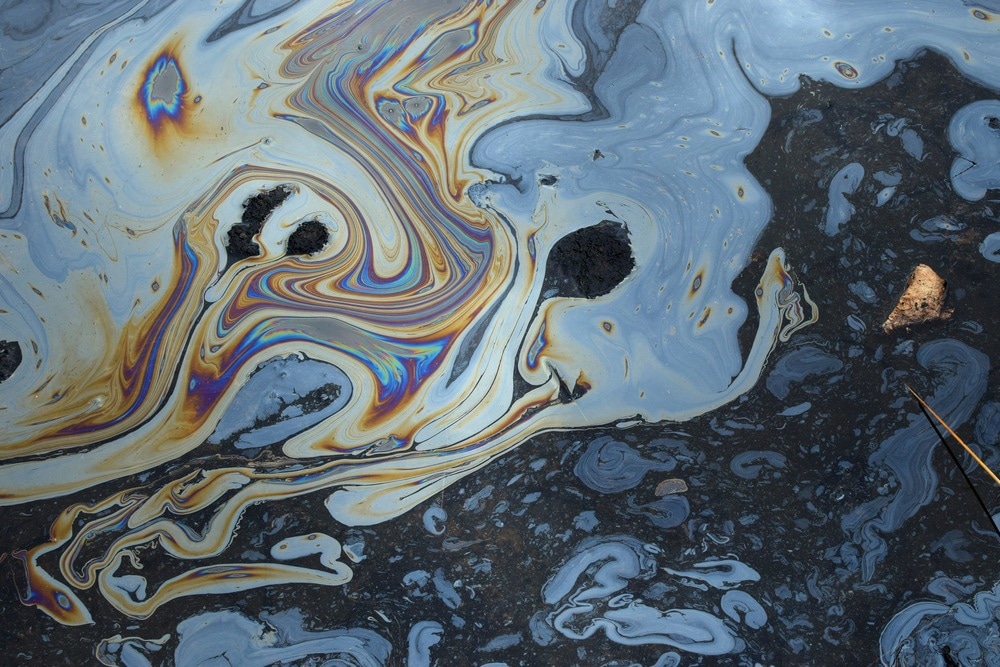In a paper published in the journal Scientific Reports, zinc ions were detected in marine environments affected by oil pollution, using mercury-free nanoporous gold electrodes for square-wave anode stripping voltammetry (SW-ASV).

Study:
Contribution of Offshore Petroleum Platforms Towards Oil Pollution
Oil pollution is becoming increasingly significant with the rapid development of the offshore petroleum production industry. Marine oil pollution is a serious threat to the natural equilibrium of the marine ecosystem.
There is a pressing need to provide offshore petroleum installation with accessible analytical instruments to address the oil pollution problem. Wastewater quality may be controlled by monitoring the metal concentration in petroleum production waters.
Detection of Metal Ions in Seawater
Electrolytic assays, including Stripping Voltammetry (SV), are becoming increasingly popular for determining trace concentrations of metals in marine environments because they are inexpensive, accessible, and can be conducted in situ in salt waters.
Numerous adjustments have been made to decrease the limit of detection (LOD) and improve the peak current signal resolution for multi-ion sensing.
These analysis techniques have achieved high levels of reliability for detecting trace metals in a wide range of sample mixtures.
A Word on Existing Methods for Zinc Detection
Zinc is among the most frequently found toxic elements in petroleum production wastewater.
Anodic stripping voltammetry (ASV) is an excellent electrochemical analysis technique for detecting zinc ions in natural waters using various electrode substances and configurations.
The SW-ASV technique is the most reproducible electroanalytical approach for in-situ studies. Mercury (Hg) based electrodes have been predominantly utilized thus far because they are highly accurate and effective at the preconcentration of metals.
Hg-based electrodes have shown remarkable accuracy in the detection of zinc ions. Unfortunately, they have significant downsides with respect to toxicity and interference with organic molecules, particularly oil.
What Did the Researchers Do?
The researchers proposed an alternate option for Hg-free electrodes capable of detecting zinc ions in a seawater and petroleum mixture. Nanoporous gold electrodes were deposited on both sides of a functionalized nanoporous PVDF film in this study.
Ultra-thin nanoporous gold electrodes are an excellent choice for detecting zinc ions. These nanoporous gold electrodes have previously been shown to effectively detect lead and mercury in natural waters.
To achieve the required sensitivity level in marine environments, nanoporous gold electrodes must be coupled with an adsorption mechanism for the effective trapping and preconcentration of zinc ions.
The nanoporous gold electrodes must also adapt the SW-ASV procedure to increase the window potential and gain access to negative zinc redox potential.
Using this technique and SW-ASV detection, PVDF-based nanoporous gold electrodes functionalized with poly(acrylic acid) were used in this study. The goal was to quantify the concentration of zinc ions in synthetic water, deionized water, and production water from an offshore petroleum platform.
Findings of the Research
The nanoporous gold electrodes functionalized with PAA and PVDF demonstrated high sensitivity for detecting zinc ions using SW-ASV in salted, deionized, and petroleum production waters over a wide concentration range.
The absorption of zinc ions by PAA was thoroughly investigated via XPS, SW-ASV, and sorption assays using ion chromatography.
Only about 30 minutes of adsorption were required to achieve zinc ion adsorption equilibrium. The poly(acrylic acid) functionalities showed a strong affinity for zinc ions in deionized water. The peak sorption capacity of the nanoporous membrane for zinc ions was found to be 1.21 mol g-1.
The rate of zinc ion preconcentration was greater in seawater samples, as evidenced by SW-ASV analysis of real production water samples.
The LOD was expected to be 4.2 μg L−1 (ppb), but the uncertainty of this estimate would increase twofold in mildly acidic production waters because of the hydrogen peak shift. However, the presented method would still provide enough reliability.
This approach would enable in-situ zinc detection in glass containers immediately after sampling water affected by oil pollution.
After spiking of zinc ions, applying the proposed electrodes in conjunction with SW-ASV monitoring showed high zinc recovery in marine water with oil pollution.
Reference
Clochard, M., Oral, O., Wade, T. L., Cavani, O., Castellino, M., Ligiero, L. M., & Elan, T. (2022). Zinc detection in oil-polluted marine environment by stripping voltammetry with mercury-free nanoporous gold electrode. Scientific Reports, 12. Available at: https://www.nature.com/articles/s41598-022-20067-0
Disclaimer: The views expressed here are those of the author expressed in their private capacity and do not necessarily represent the views of AZoM.com Limited T/A AZoNetwork the owner and operator of this website. This disclaimer forms part of the Terms and conditions of use of this website.